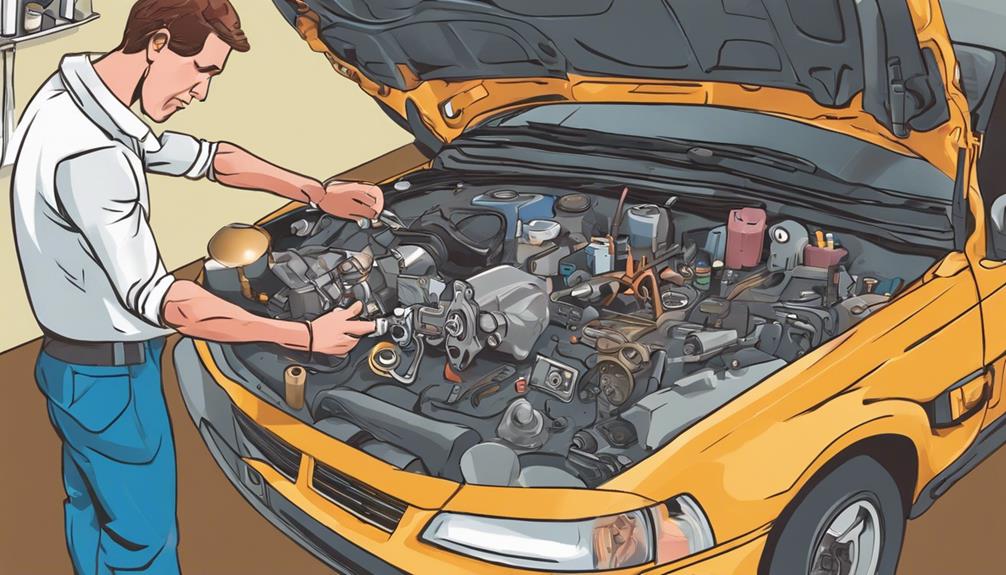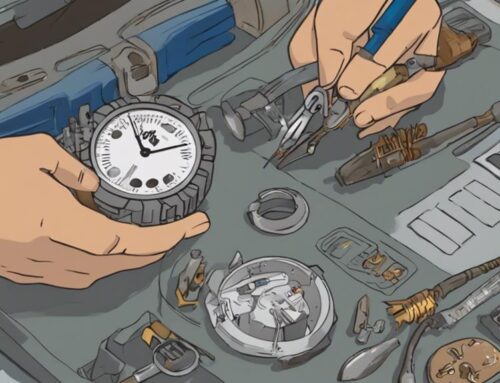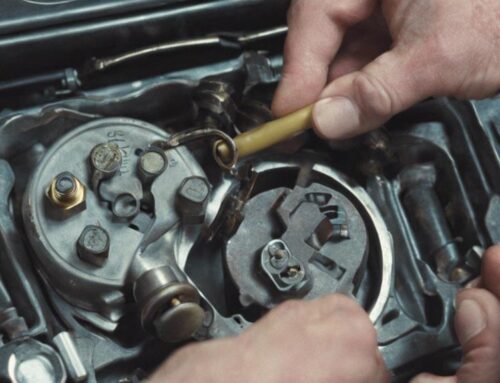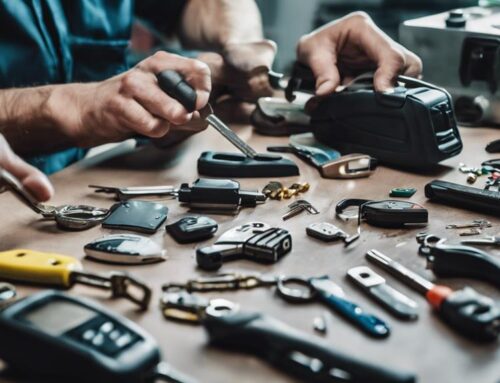Yes, a locksmith can replace your car’s ignition cylinder. If you’re facing issues like difficulty turning the key, the key sticking, or it failing to start the car, these are signs that you might need a replacement. Locksmiths are equipped with the necessary tools and expertise to replace ignition cylinders efficiently and are often more cost-effective than dealerships. They’ll assess the damage, remove the old cylinder, and install a new one, ensuring it functions correctly with thorough testing. Opting for a locksmith can save you time and money. Discover how much more you might benefit from their services.
Understanding Ignition Cylinders

The ignition cylinder, situated near your steering column, is essential for starting your vehicle and controlling its electrical system. It’s like the secret clubhouse where your car’s start-up rituals are held, and only the right key gets you in. Now, when this nifty component decides to act up, you might find yourself unable to ignite your car’s love for the open road. Enter the locksmith, your car’s relationship counselor. They’re trained to diagnose these temperamental ignition issues. Whether it’s stubborn keys or a full-blown cylinder meltdown, they handle ignition repair or replacement with a deft touch. So, before you start a stressful relationship with your dealership, remember that locksmiths offer a time-saving, wallet-friendly alternative!
Signs You Need Replacement

If you’re struggling to turn your key in the ignition or it sticks and won’t turn, these are clear signs that your ignition cylinder may need replacing. It’s like your car is playing a cruel game of “keep away” with your sanity. When your key gets cozy and decides it won’t leave the ignition lock cylinder, you’ve hit another classic sign of ignition trouble. If starting your car becomes a mini workout session or you’re doing a jiggle dance with the key to coax the engine to life, these are your car’s way of crying for help. Ignition cylinders showing wear, such as sticking or grinding noises, are basically begging for a retirement party. Don’t ignore these cry for help!
Locksmith Replacement Process
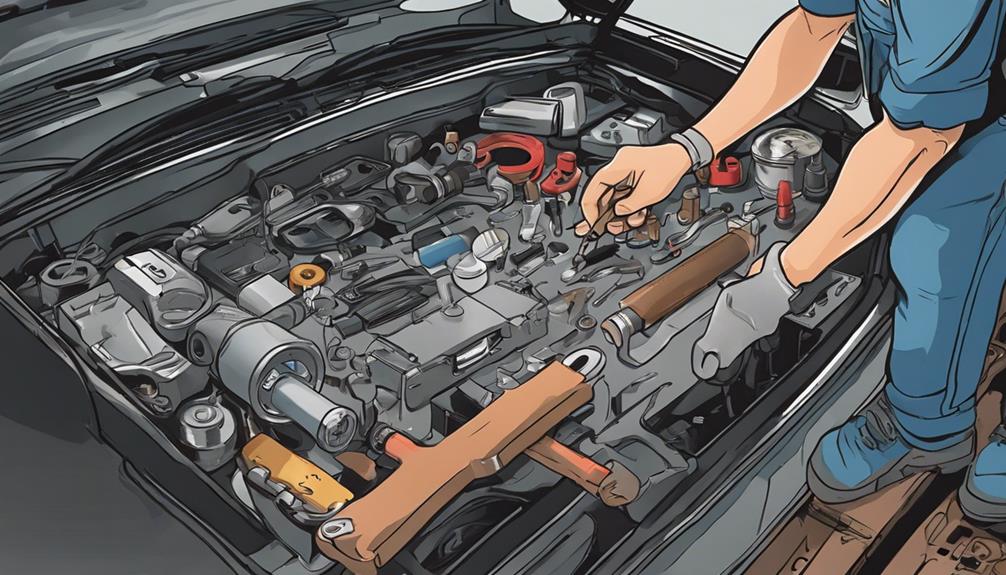
When you contact a locksmith to replace your car’s ignition cylinder, they’ll start by evaluating the damage to your ignition system. They’ll gather the necessary tools and parts to make sure the replacement fits perfectly and functions as intended. The final step involves carefully installing the new cylinder and testing it to make sure your car starts smoothly and reliably.
Assessing Ignition Damage
To assess ignition damage, a locksmith examines the condition and functionality of your car’s ignition cylinder. If your car key starts playing hide and seek with the ignition, or worse, roughing it up like a schoolyard bully, it’s a sign to call in the pros. The locksmith dives into detective mode, gauging whether the ignition drama is a quick fix or a total replacement scene based on the damage’s soap opera. They’ve got the chops to decide if your ignition is just throwing a tantrum or if it’s genuinely kaput. Remember, opting for a locksmith might not just save your ignition’s life but could be kinder on your wallet than a dealership’s premium spa treatment for cars.
Necessary Tools and Parts
For a successful ignition cylinder replacement, locksmiths need specialized tools such as key extractors, ignition switch removal tools, and torque wrenches. Now, you might think these tools sound more like something out of a spy movie than a locksmith’s kit, but trust me, they’re essential for any LOCKSMITH: IGNITION REPAIR mission. Besides these cool gadgets, they also need a new ignition lock cylinder and a shiny new key set, because let’s face it, you can’t replace the ignition without the right parts! So, if you’re looking to get a key replacement or just Replace the ignition, remember, the right tools and a bit of locksmith magic are all it takes!
Installation and Testing Steps
Having gathered the necessary tools and parts, let’s now walk through the steps a locksmith follows to install and test a new ignition cylinder in your car. First, they’ll dismantle the steering column, a bit like a surgeon but less bloody. Then, the old ignition cylinder is out, and the shiny new one slots in—hopefully no square peg, round hole situation here.
| Step | Description |
|---|---|
| Installation | Align and connect the new ignition cylinder. |
| Testing | Turn the key to make sure it’s as smooth as butter. |
| Inspection | Confirm everything works, no funny business. |
After installation, a quick test of the key rotation ensures your car starts like a dream, and a thorough inspection confirms you’re good to go. Voilà, ignition success!
Benefits of Locksmith Services
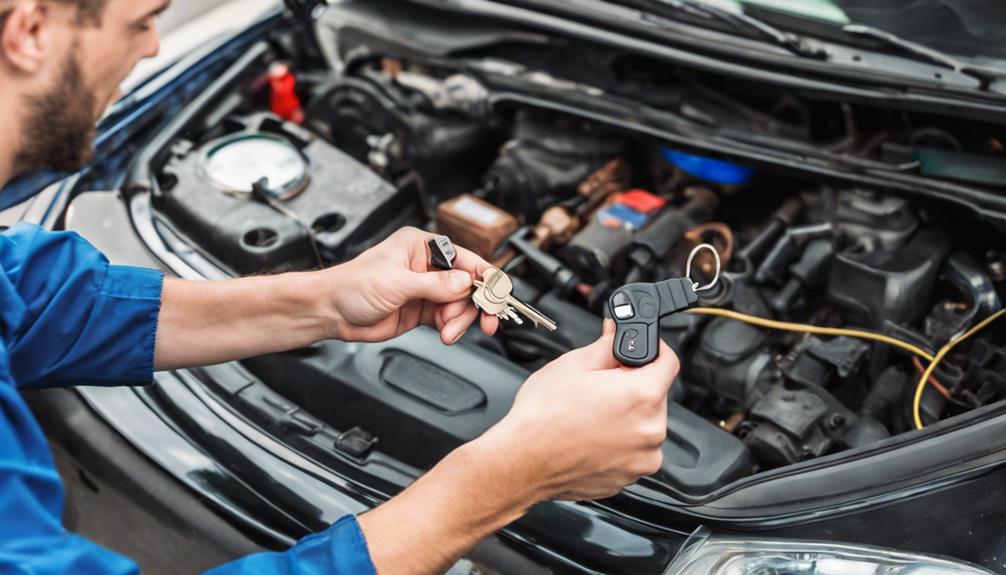
Locksmiths provide several benefits when replacing your car’s ignition cylinder, including on-site service that saves you both time and the cost of towing. Imagine not having to haul your metal baby to the dealership and waiting in those bleak, coffee-stained waiting rooms. With locksmith services, they come to you, whether you’re stuck at home or stranded in a parking lot. Besides the convenience, these magicians of metal are also wizards at making the whole ignition cylinder replacement process quick and painless. They’re trained to avoid any vehicular surgery scars, keeping your car’s integrity intact. Plus, choosing a locksmith over a dealership often turns out to be more cost-effective. So, you’re not only saving hassle but also your wallet!
Cost Considerations
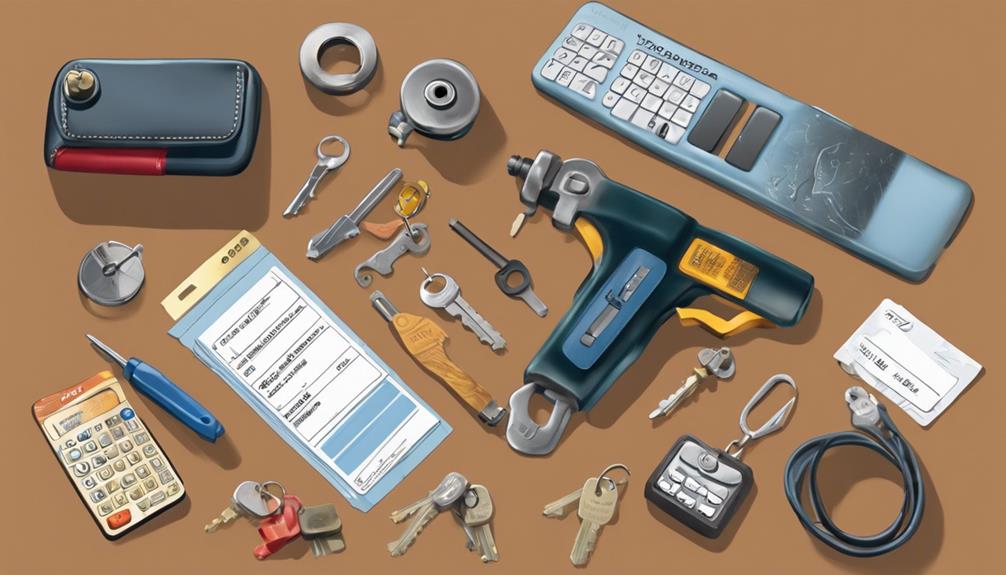
When considering the replacement of your car’s ignition cylinder, you should be aware that costs can vary widely. Factors that affect the price include the make and model of your vehicle and whether you opt for aftermarket parts. To manage your expenses effectively, it’s wise to explore budgeting tips and compare quotes from different locksmiths.
Average Replacement Costs
Replacement costs for a car’s ignition cylinder typically range from $50 to $700, varying by vehicle type and job complexity. So, if you’re looking to save a buck, consider aftermarket parts which might just be your wallet’s new best friend. Now, let’s chat labor costs—they usually hang around $100 to $300. Yep, that’s quite the range! It’s like choosing between a budget-friendly diner and a fancy steakhouse. Either way, you’re shelling out some cash, but the choice could sway how thick your wallet stays. With all these numbers flying around, remember that opting for cheaper alternatives and shopping around for service prices can really keep your bank account from breaking up with you prematurely.
Factors Affecting Price
Several factors influence the cost of replacing your car’s ignition cylinder, including the type of vehicle, job complexity, and choice of parts. If you’ve got a fancy ride, expect to pay more. Why? Because everything’s more expensive when it’s fancier, right? Labor costs also play a big part in the total bill. Depending on who you hire, you might end up paying as much for their time as you do for the parts!
Opting for aftermarket parts can save some cash, but remember, you get what you pay for. They’re like the store-brand cereal of car parts. Lastly, don’t forget the potential extra bucks for reprogramming your car’s anti-theft system—it’s like giving your car a mini-brain transplant!
Budgeting Tips
Now that you understand the factors affecting the cost, let’s explore some practical budgeting tips to manage the expenses of replacing your car’s ignition cylinder. Considering the hefty price range of $50 to $700, why not opt for aftermarket parts? They’re like the store brand cereal—just as good but won’t make your wallet cry. Don’t forget, going to a professional locksmith can also save you some pennies compared to dealership rates, especially with labor costs that might wave goodbye to $500. And remember, while reprogramming your car’s anti-theft system sounds like rocket science, it’s just another reason to budget wisely unless you enjoy surprises in your bills as much as forgotten car keys!
Choosing the Right Locksmith
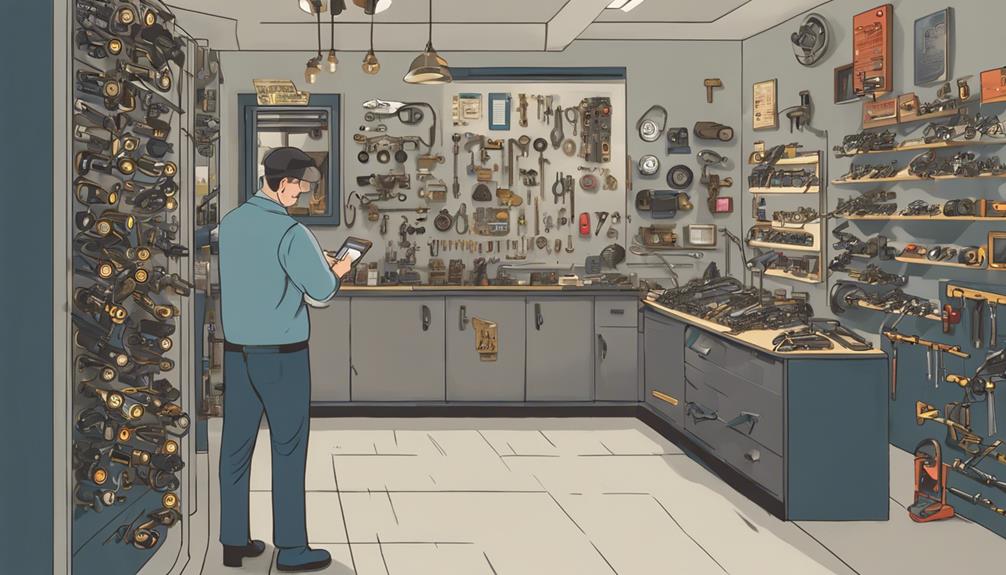
When picking a locksmith to replace your car’s ignition cylinder, make sure they have extensive experience with your specific vehicle type. You don’t want just any Joe Schmo fumbling around under your steering wheel, right? Look for locksmiths with sparkling reviews and those shiny certifications that scream, ‘I can actually do this!’ It’s also wise to check if they offer any warranties or guarantees on their work—because who wants a do-over a week later? Lastly, make sure the pricing is as clear as your windshield on a sunny day; hidden fees are as welcome as a flat tire. So, choose a locksmith trained for your car’s make and model, and you’ll be back on the road in no time.
Maintenance Tips Post-Replacement
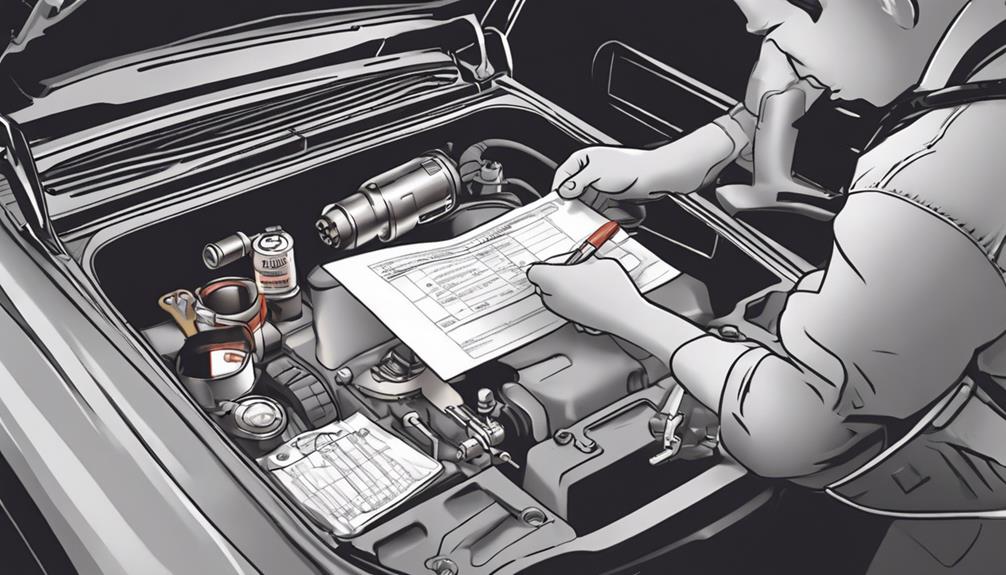
After replacing your car’s ignition cylinder, it’s important to test all keys to make sure they function properly. You wouldn’t want to get all revved up with nowhere to go because of a key mishap, right? Next up, give that new ignition cylinder a good alignment check with the steering column; it’s essential for avoiding a wobbly driving experience. Don’t forget to lubricate the cylinder to keep things running smoother than a slick sales pitch. Regularly peek at the ignition to spot any early signs of wear or those pesky damages, and keep a spare key handy – because being locked out is only fun in musical chairs. Stay sharp, stay prepared!
Contact Low Rate Locksmith

If you’re facing ignition cylinder troubles, contact Low Rate Locksmith for efficient and cost-effective replacement services. When your car begins acting like a moody teenager refusing to start, it’s probably time to give these guys a call. Their team of experienced locksmiths specializes in making your car’s temper tantrums a thing of the past. They’ll swoop in faster than you can say “ignition cylinder crisis” and fix up your ride on-site. No need for those pricier dealership detours! With Low Rate Locksmith, you’re not just saving cash; you’re also getting back on the road with minimal fuss. So, don’t let a stubborn ignition lock down your day—dial up Low Rate and steer clear of car troubles!
Frequently Asked Questions
Can a Locksmith Program a New Key Fob for My Car?
Yes, a locksmith can indeed program a new key fob for your car. They’ve got the tools and know-how to sync your new fob with your car’s security system, making it a breeze. This usually takes about 10-30 minutes and can be done wherever it suits you best, saving you a trip to the dealership. Plus, it’s often cheaper than dealer prices. So, you’ll be back on the road in no time!
Is Replacing an Ignition Cylinder Covered Under Car Warranty?
Generally, your car warranty won’t cover replacing an ignition cylinder, as it’s often considered a wear-and-tear item, not a manufacturer defect. If you’ve installed an aftermarket cylinder, don’t count on the warranty either. Always check your warranty’s terms for specifics. If it turns out it’s not covered, a locksmith could be your next best bet for replacing the cylinder without breaking the bank.
How Long Does an Ignition Cylinder Typically Last?
You’re not out of the woods yet when it comes to your car’s ignition cylinder; it typically lasts between 50,000 to 100,000 miles. However, this longevity hinges on factors like how often you turn that key and how well you maintain the cylinder. Regular TLC with lubrication can help stretch its life further. Remember, newer models might outlast older ones thanks to better materials and tech advances in their cylinders.
Can I Replace an Ignition Cylinder Myself?
Yes, you can replace an ignition cylinder yourself, but it’s tricky. You’ll need specific tools and a solid understanding of your car’s model. However, DIY could void any warranties and, if done wrong, might lead to electrical problems or safety issues. For peace of mind and guaranteed functionality, it’s safer and often more efficient to hire a professional locksmith who’s equipped to handle the installation correctly and quickly.
Are Aftermarket Ignition Cylinders Reliable?
Ironically, while you might trust your ancient car not to start in the morning, aftermarket ignition cylinders are actually quite reliable. Manufactured often to meet or exceed OEM standards, these parts aren’t just substitutes but viable upgrades. They come with warranties and a variety of design options, ensuring that your vehicle starts more consistently than your old coffee maker. Just make sure a skilled locksmith does the installation to avoid any misfires.

